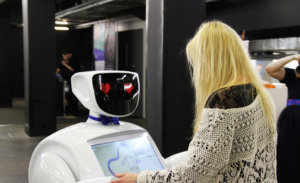AI grows big in Russia: Sberbank starts leasing robots, law on robotics in the works
As Sberbank starts leasing Promobot, robots that may replace human staff in various positions become more affordable.

The advances of artificial intelligence (AI) solutions in various areas of the financial services industry are now undisputed. Russia has provided us with another piece of proof of the growing role of robotics, as robots have just become available to a wider range of businesses thanks to Sberbank Rossii PAO (MCX:SBER).
Sberbank Leasing, a part of the Sberbank group of companies, has just announced that it launches a leasing program for Promobot (v2 and v3) – an autonomous robot that may replace human staff in various roles, including customer support, administration and consultation. The move is set to lead to increased adoption of the solution. Until now the price of Promobot started at RUB 1.2 million. The leasing makes the solution more affordable. Furthermore, it claims to reduce expenses associated with human staff.
Although this is apparently a good piece of news for businesses seeking to accelerate client service and cut expenses, human employees are facing challenging times, as robots increasingly replace human beings in a number of positions. Earlier this year, Sberbank announced the launch of a robot lawyer capable of writing claims for the retail clients of the bank. The program is set to take over the jobs of 3,000 employees at the bank’s legal department.
The risk of human beings losing their jobs to robots has already sparked regulatory concerns. In February this year, MEPs voted a resolution that urges the European Commission to draft rules for the field of robotics to be applied across the European Union. Job losses form a key part of the concerns of the European Parliament with regards to robotics.
Russia is looking forward to a law on robotics too. Early this year, Vyacheslav Volodin, Chairman of the Russian State Duma, voiced his support for drafting such a law. He then said that rules governing the human-robot relations were set to be implemented in 2022.
Meanwhile, private law firms have also advocated the adoption of such a law. HEADS Consulting, for instance, has thrown its weight behind a project for a robotics law. One of the crucial moments in the document will be the necessity for changing the job profile of certain human employees with regards to the increased use of robots by businesses.
(Image Credit: PROMOBOT.)









